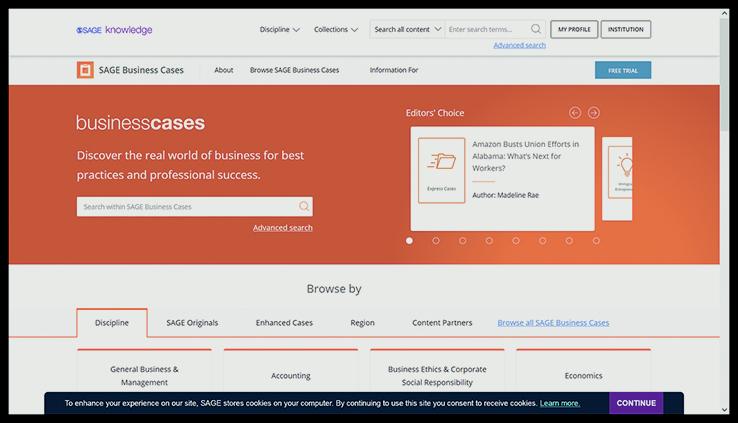SAGE Business Cases | Reference eReviews
A database of more than 3,650 business case studies that reflect the depth, diversity, and global nature of the modern business world. An excellent resource for academic libraries that serve business departments; cases are easily discoverable and offer enhancements like teaching notes and discussion questions.
SAGE Business Cases
CONTENT
SAGE has collaborated with a variety of respected content partners to create a database of more than 3,650 business case studies, with scenarios that offer students a chance to apply critical thinking skills. The database was developed by academics to assist faculty and students in undergraduate and graduate business school courses; collaborators include the Yale School of Management, the Kellogg School of Management at Northwestern, and the Haas School of Business at the University of California–Berkeley, as well as institutions in China, India, Russia, South Africa, and the UK.
Topics include accounting, management, marketing, operations management, small business entrepreneurship, international business, and more, with contemporary and global perspectives; private businesses, small start-ups, and Fortune 500 companies alike are covered. To keep the collection relevant, SAGE encourages scholars, instructors, and practitioners to submit cases for peer review. Cases are accompanied by teaching notes, teaching strategies, and discussion questions.
USABILITY
The home page’s layout is simple; searching, navigation, and discovery are seamless. Across the top of the landing page are links: “About”; “Browse SAGE Business Cases”; “Information”; and “Submit Case” (with submission guidelines and templates). Below that are a basic search box and links to “Advanced Search,” “Browse By” options, and “Browse All SAGE Business Cases.” At the bottom of the page are eight broad subject categories for searching and several featured business cases.
Cases can be easily found from the home page by clicking “Browse SAGE Business Cases” or using the “Browse By” options. Either approach enables users to search by discipline, region, or case collections. In total, there are 16 disciplines, eight global regions, and three case collections. In an advanced search, users can enhance or narrow results by search terms, author, discipline, content type, and publication date.
Once cases are retrieved, they can be filtered by content type, region, supplemental resource, case length, discipline, works and sections, and publication date. Results can be sorted by title, relevance, and original publication date. Cases range from hundreds to thousands of words, with full metadata, abstract, case description, and learning outcomes. Teaching notes are available only to instructors, who can share access codes with students and other faculty. Text is clear, legible, and adjustable. Content can be downloaded, printed, cited, emailed, and shared.
PRICING
Costs vary by institution type and size; annual subscriptions range from $5,200 to $17,250, and one-time purchases range from $4,300 to $68,850.
VERDICT
With cases that reflect the depth, diversity, and global nature of the modern business world, this is an excellent resource for academic libraries that serve business departments. Cases are easily discoverable and offer enhancements that instructors and students will value. EBSCO’s Academic Search Complete, Emerald, and Harvard are other business case providers that libraries might want to consider, although given that Business Cases is accessible on the SAGE Knowledge platform and integrated with other SAGE ebooks, videos, and reference content, libraries that already own or subscribe to SAGE resources may find it a plus.
Rob Tench is a Librarian at Old Dominion University Libraries, Norfolk, VA.
RELATED
ALREADY A SUBSCRIBER? LOG IN
We are currently offering this content for free. Sign up now to activate your personal profile, where you can save articles for future viewing










Add Comment :-
Comment Policy:
Comment should not be empty !!!